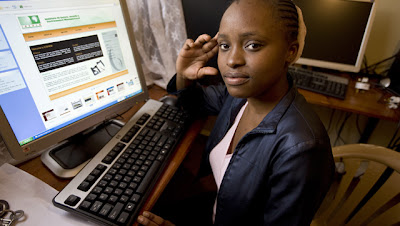As the Global Forum on Development (GFD) 2013
draws closer, Cameroonian blogger Julia Owono of
Global Voices has written about recent online exchanges on poverty reduction,
including a TEDx talk in Mongolia and the ongoing online discussion in
preparation for the GFD.
The quest
is on for solutions to poverty reduction with the approach of the 2015 deadline
for the UN Millenium Development Goals (MDG). Many
organizations are exploring new avenues for answers, hoping it can lead to
fresh ideas. Among the goals agreed to by the international community more than
a decade ago was to halve the number of people suffering from hunger, and for
the world's poorest citizens to gain productive employment. Most of the targets
are far from being met in most countries, but progress has been made, for
instance in Sub Saharan Africa where the proportion of people living on less
than USD 1.25 a day declined from 58% to 51% between
1990 and 2005.
Ideas exchange on the
internet
The
Organisation for Economic Co-operation and Development (OECD) will hold their
annual Global Forum on Development in Paris on April 4-5,
2013. This year, the OECD is exploring more inclusive approaches to tackle the
poverty issue by inviting to anopen pre-forum discussion online with
OECD scholars. All the main conversation topics on the agenda are laid out for
everyone to see and contribute.
Another
interesting approach to online ideas exchange is hosted by Concerned African Scholars, an organization of
scholars and students of Africa. Among the many issues explored is the impact of the hundreds of billions
of dollars flowing illicitly out of Africa on the slow progress
of poverty reduction. The author, Janvier D. Nkurunziza, suggests one key to
bringing down poverty would be "the repatriation of the resources which
are currently held abroad and not benefiting the continent."
Had Africa had not lost so much resources in the form of illicit financial transfers, it is likely that poverty would have been less acute. The logic is that keeping these resources in Africa would have produced higher rates of investment, allowing African countries to invest in productivity enhancing sectors such as infrastructure, creating jobs, and raising incomes, resulting in lower levels of poverty.
In
a TEDx talk in UlaanBataar, Mongolia on
"Social Media and Poverty Reduction" in September 2012, Robert Reid,
the Resident Country Director of the Millennium Challenge Corporation in
Mongolia, highlighted the necessity of a broad public participation in poverty
reduction projects, stressing the importance of private sector involvement for
sustainable development. "It's
important that the involvment of the private sector be considered at the
beginning of discussions on how to reduce poverty," he says.
This
multistakeholder approach is also a key tenet of the open data movement, which is
progressively penetrating the development sphere. The Uganda
Open Development Partnership Platform, a civil society
organization-led public initiative, is an example of what open data could bring
to the debate on poverty reduction:
Open
development is where organisations are using information technologies, among
other information sharing channels, to provide and share information. Open
development enhances transparency and accountability about resources that are
available to be invested in development, how those resources are invested and
what results they achieve. In the end, all the stakeholders involved in this
information sharing chain; the data owners and users benefit from this mutually
reinforcing ecosystem
Discussion questions
The past two decades has
seen decreases in both the number of people living in absolute poverty and the
rate of poverty in the developing world. This has resulted in part from rapid
economic growth, but also from the adoption of active poverty reduction
policies, in particular in the framework of the MDGs.
Even though the
objective of reducing poverty remains a priority, other social goals need to be
tackled today. In this respect, by focusing on three complementary dimensions –
social inclusion, social capital and social mobility – social cohesion
represents an important challenge for policy makers. While the adoption and
rapid propagation of institutional innovations – such as conditional cash
transfers, employment guarantee schemes and social savings accounts – have
helped to alleviate poverty in many developing countries, they have also
contributed to creating fragmented social systems, which can deepen divisions
in society.
Questions
- What should be the priorities of a renewed social cohesion agenda?
- What policy mix best addresses the multi-dimensional nature of social cohesion?
- What institutional innovations have enhanced the social inclusion and mobility of vulnerable and discriminated populations?
- Is the implementation of universal social programmes achievable in developing countries?
The OECD
Global Forum would like to hear your opinions the above. Click here to
discuss


